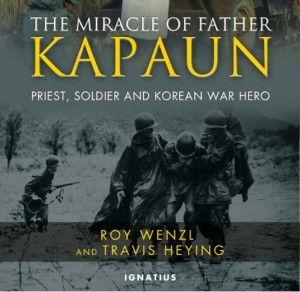I’ve not read The Miracle of Father Kapaun; keep that in mind. I’ve read mostly from the Amazon “Look Inside” excerpts for this nonfiction biography of a war hero.
Let’s examine the technical quality in one brief excerpt, remembering that the quality of ideas, the noble life, the Christ-like example—those can compensate for imperfect English with ease. What follows, I hope, will not distract from the deeper value of this book. For the moment, I merely encourage improvement in writing quality in one detail.
Quality Writing
Consider the following sentence, keeping in mind the context: an army chaplain who assisted wounded soldiers during the Korean War. What do you think of it?
He literally carried a wounded soldier on a long, torturous forced march to the prison camp.
I don’t imply that any basic rule of English has been violated: I see nothing wrong in punctuation or spelling. By the way, if you thought that “torturous” was the wrong word, I disagree, for the soldier was probably suffering pain relevant to a word like “torture.” The problem is subtle.
Whether it’s by a medic or chaplain or regular soldier, a wounded comrade is carried in somebody’s arms. The word “literally” can distract from that simple act, tempting the reader to wonder, for a moment, how a wounded soldier could be non-literally carried. I know this is trivial in itself, but it gives us a clue that the writer is probably not professional, and imperfections can add up over the course of 200 pages.
The point? Avoid any adjective or adverb (or any other word) that will distract from what we want to portray.
A Distracting Metaphor
Accidentally distracting the reader need not come from one word. A poorly thought out metaphor can be distracting, as in the following example of my own making, keeping to the same subject:
Using the word “literally” in the above sentence is not in itself disastrous, not like tripping while carrying a wounded soldier and dropping the man onto the ground.
Notice how the above metaphor does the opposite of what is intended? We imagine the fall and the poor injured soldier hitting the ground—a serious accident—but the point was intended to be that something is not disastrous. Beware of putting “not” in front of a metaphor.
The Miracle of Father Kapaun
While writing this post, two or more copies of The Miracle of Father Kapaun may have been sold on Amazon, for it’s now ranked #574. The quality of English is not a strain on sales of this book, or many other books I suppose, when the interest and value is great.

Priest, Soldier and Korean War Hero
.



